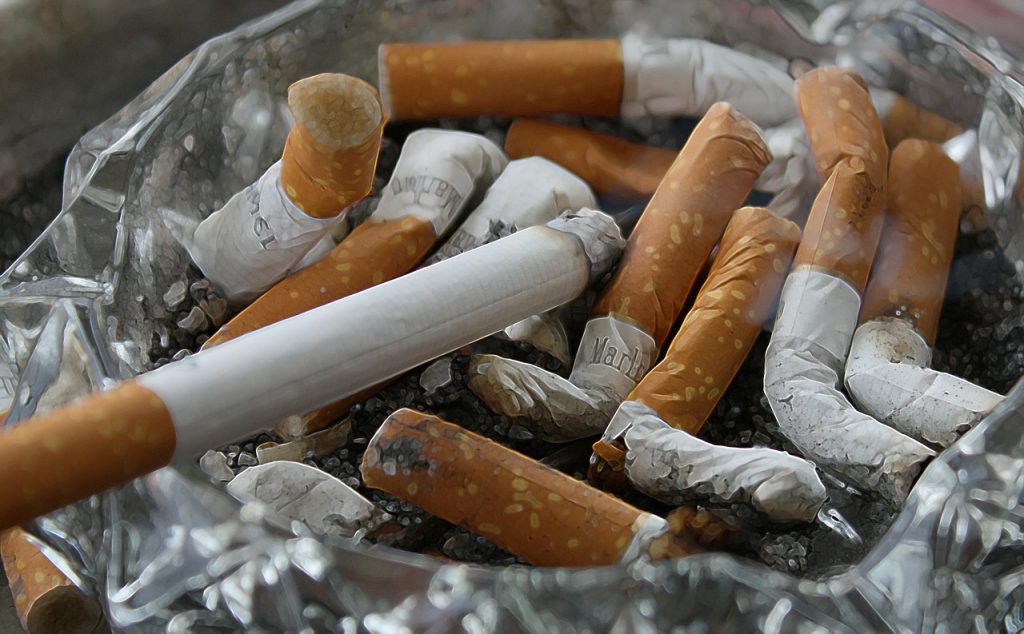
It’s no secret that using tobacco products, whether it’s cigarettes or chewing tobacco, is bad for your health. However, despite the dangers, over 17 percent of North Carolinians continue to smoke cigarettes. What you may not realize is the extent of health problems that can be caused by smoking and chewing tobacco, including what it can do to your oral health. To shed some light on this topic, our dentist in Cary is sharing exactly how tobacco and smoking can affect your teeth and gums.
Tobacco Stains Your Teeth
Smoking cigarettes and using chewing tobacco both stain your teeth over time. The tar and nicotine sit on your teeth, turning them yellow and over time, they can even darken to a brownish color. While professional teeth whitening can remove years of staining and restore the brightness back to your smile, if you continue to use tobacco products, they won’t stay white and bright for very long.
Cigarettes Cause Prolonged Bad Breath
All the tar, nicotine, and chemicals that go into your mouth when you smoke a cigarette or put a pinch of tobacco in your lip stays in your mouth. That odor can linger on your breath, but that’s not the only way tobacco affects your breath as nicotine and other compounds can shut down your mouth’s ability to fight bacteria which leads to decay and gum disease. Both of these can lead to bad breath that mouthwash and brushing can’t fix.
Smokers Have an Increased Risk of Cavities and Gum Disease
Bacteria is at the core of tooth decay and gum disease. Plaque rests on the teeth and gums, feeding bad bacteria in the mouth which creates an acidic reaction that wears through enamel and causes a cavity and harms the gums. Brushing, flossing, and minimizing sugar can remove and reduce dental plaque, but your body also needs to be able to fight off the bacteria.
Smoking affects how your body responds to oral bacteria. Nicotine suppresses the immune system and minimizes inflammation. Normally, minimal inflammation around the gums is a good thing, but in the event that there is bacteria present, inflammation acts as an immune response to fight off infection and control bacteria. Without this immune response, the gums begin to recede, decay occurs, and cavities form.
Smokers Are at an Increased Risk of Tooth Loss
Did you know that men who smoke a pack of cigarettes a day for 10 years lose on average of three teeth? For women, it’s closer to two teeth. That means if you start smoking at 20 and smoke around a pack a day, by the time you’re 40, you’ll have lost four to six teeth.
One theory is that tobacco use cuts down on blood flow to the gums which blocks nutrients to the teeth, causing them to weaken and decay. The more likely reason is a chain reaction. The plaque build-up that causes decay and gingivitis gets worse as you continue to smoke, while smoking affects the density and health of bone and soft tissues. This means that the jaw and gum lose their integrity as decay worsens, making smokers more susceptible to infection and having teeth removed.
Smokers Don’t Heal As Well During Dental Procedures
While years of smoking and tobacco use leads to cavities, gum disease, and tooth loss, having these problems fixed can be difficult for smokers. Remember, smoking affects the immune and healing response in the body, slowing them down, and this means that having a tooth extracted or getting periodontal treatment to restore damaged or decaying teeth is slower and more challenging.
Increased Risk of Oral Cancer
While decay, tooth loss, and gum disease are scary, the greatest threat to your oral health is the increased risk of oral cancer that smokers have. Cigarettes and chewing tobacco contain more than 60 known carcinogens (cancer-causing ingredients), and because of this, smokers are 10 times more likely to develop cancer in their mouth or on their gums.
Can You Restore Your Teeth After Smoking?
The good news is that when you quit smoking or using tobacco, you can begin taking steps necessary to reclaim your dental health. Some tips to help you quit include:
- Write down all the reasons you want to quit – money, health, family well being, etc;
- Ask for support from people in your life, including family and friends;
- Keep your hands busy by taking up a craft like art, crochet or knitting, or even playing a video game;
- When the urge to smoke hits, drink a glass of water, chew a piece of sugar-free gum, or go for a walk instead.
- Talk to your doctor about over the counter and prescription medications that may help you quit.
Once you quit smoking, your body will work on healing, and a dentist in Cary can help you create a plan to restore any damage that has taken place, from cosmetic fixes to restorative dentistry.
Schedule an Appointment with Our Dentist with Locations in Cary and Holly Springs
If tobacco use has left you with dental health issues, we can help. To schedule an appointment, give our dentist office in Cary a call at (919) 467-2203 or reach out to our Holly Springs dentist office at (919) 600-6262 and you can also use a contact form to request an appointment.

